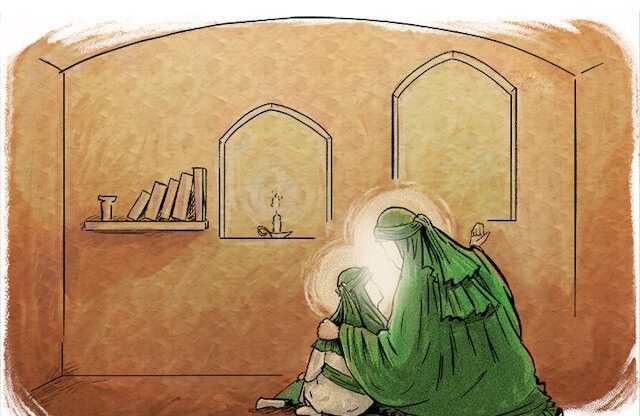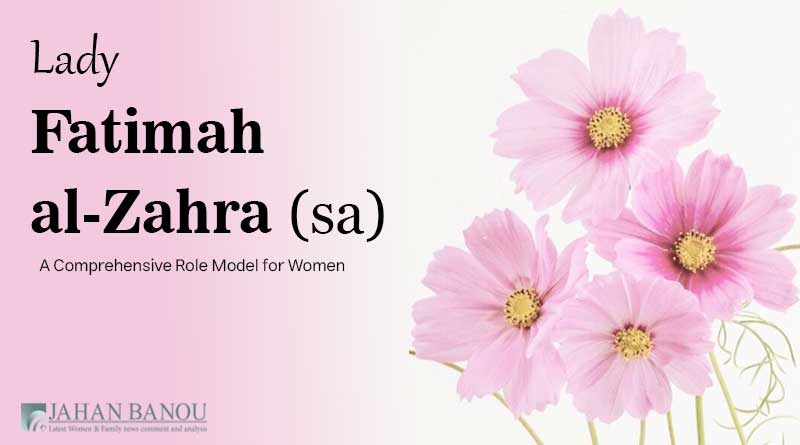A beloved daughter, a vibrant mother, a spouse worthy of Amir al-Mu’minin (Imam Ali), and a principled woman in the political arena – these are qualities rarely found in one individual. Yet, we are honored that the greatest woman of Islam, Fatimah al-Zahra (peace be upon her), embodied all these attributes while remaining a devoted servant of God. The following points highlight some of her remarkable qualities:
Fatimah’s (sa) Devotion and Worship
Her servitude to God was so profound that residents of Medina would notice a radiant light emanating from her home in the middle of the night. The Prophet (peace be upon him and his family) explained its source: “When Fatimah stands in her place of prayer, thousands of angels send blessings upon her and address her as the ‘Mistress of the Women of the Worlds’… She was devoted to lengthy prostrations, standing in prayer, and prolonged bowing, worshipping God with all her being.”
Piety and Modesty, Even Before the Blind
Her devotion was unwavering, both in public and private. She meticulously obeyed God’s commands in all circumstances.
Even in the presence of a blind man, she maintained her modesty (hijab). When asked about the reason, she replied that God is the observer of her actions, and she veils herself before any non-mahram (a man she is not related to within certain degrees of kinship).
A Proof of God for the Infallible Imams
Fatimah (sa) reached such a high level of servitude and devotion to God that an infallible Imam stated: “We are God’s proof for the people, and our grandmother Fatimah al-Zahra is God’s proof for us.” Indeed, a woman in Islam can attain such a high status before God, with no limitations in this path.

Fatimah’s (sa) Personal and Family Life
Her interactions as a daughter were so heartwarming that the Prophet (pbuh) was always delighted upon seeing her, kissing her hands and face. Her daughterly love was so abundant that numerous accounts describe how she would comfort the Prophet when he suffered the hardships of conveying God’s message.
The Most Respectful Address to Her Father
Fatimah (sa) maintained the utmost respect for her father. After the revelation of verse 63 of Surah An-Nur, which forbade Muslims from addressing the Prophet by his name, she began addressing him as “Ya Rasul Allah” (O Messenger of God). However, the Prophet (pbuh) told her that she could call him “Father,” as God was more pleased with that.
The Beloved of the Prophet and the Owner of Fadak
Her position with her father was so special that after the conquest of Fadak, and following God’s command in verse 26 of Surah Al-Isra, “And give the relative their right,” the Prophet (pbuh) bestowed this vast land upon her. Due to the size of Fadak, Fatimah (sa) appointed an administrator, and its benefits reached many Muslims.

The Vibrant Home of Fatimah
Fatimah’s (sa) home was filled with warmth and vitality. Despite her and Imam Ali’s (as) responsibilities, she never neglected raising her children, playing with them, and even reciting educational poetry for them. The best of God’s creation were nurtured in her care, and Imam Ali (as) described his marital life, saying: “Fatimah never angered me, nor did I ever anger her.”
Fatimah (sa) in the Political and Jihad Arena
The mother of the Ummah (Muslim community) was never passive. While maintaining all proper boundaries, she stood firmly alongside her father and husband in seeking justice. For instance, when Abu Jahl threw the entrails of a sheep on the Prophet (pbuh), she, despite her young age, went to the Masjid al-Haram, cleaned her father, and rebuked Abu Jahl.
Supporting the Right of the Prophet’s Successor in the Most Difficult Days
After the Prophet’s passing and the immense hardships that befell Imam Ali (as), Fatimah (sa), in the depths of grief over her father’s loss, went to the homes of the companions, seeking their testimony regarding Imam Ali’s (as) right to leadership and reminding them of the event of Ghadir, so that the event would never be forgotten. Ultimately, she sacrificed herself in this path.


